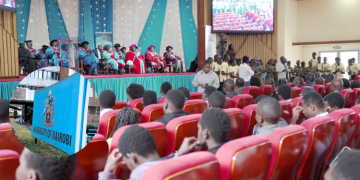A High Court ruling has issued a warning to Kenyan business owners entering into tender agreements involving international or multinational firms.
The warning comes from a High Court ruling that struck out a case brought by distributor Rucetah Njeru against Neolife International Limited.
Njeru moved to the Constitutional and Human Rights Division after Neolife terminated her tendering agreement.
However, a key clause in her contract stating that the agreement would be governed by the laws of the Republic of South Africa was used by the Respondent company to argue that the Kenyan High Court lacked the jurisdiction to hear the matter.
The contract that was executed between the parties provides that the laws of the Republic of South Africa would govern their relationship. This Court lacks jurisdiction to hear this matter.
Also Read: Principal Fired by TSC Weeks Before Retirement Wins Millions
South African Law vs. Kenyan Business
The dispute began when the Respondent, Neolife International Limited, terminated the tender agreement that Rucetah Njeru and her husband had entered into.
Therefore, Njeru filed a Petition in the Constitutional and Human Rights Division of the High Court, alleging that the Respondent’s actions during the disciplinary hearing process violated her constitutional rights.
The Respondent then filed a Preliminary Objection (PO), arguing that the entire Petition should be struck out.
Among their primary reasons was the explicit clause found in the agreement itself.
Counsel for the Respondent pointed out that the Petitioner did not dispute the existence of the Agreement dated 15th October 2001.
In that Agreement, “Clause 15 clearly indicates that the Agreement between the Respondent and the Petitioner would be governed by the laws of South Africa”.
The Respondent relied on judicial precedent, citing the Ndunda v Qatar Airways QCSC case, where a court upheld a clause requiring disputes to be referred to the Qatari Courts and construed according to Qatari laws.
Consequently, the court in that case noted that the contract “ousted the jurisdiction of this court by defining the forum that was to govern matters arising or relating to the employment contract”.
Also Read: WHO Opens Tenders for Kenyans Including Catering
The Kenyan Begs Court
In response, Njeru’s lawyers urged the court to look past the South African law clause, insisting the business was based in Kenya and should be judged under Kenyan law.
“The distributorship business was wholly performed in Kenya in accordance with the laws of Kenya.”
Additionally, Njeru explained that taking the case to South Africa would be a financial burden.
“The witnesses and the evidence for use in the trial are both readily available in Kenya. Referring the suit to South Africa will add to the expenses of the trial in travel costs for the Petitioner and witnesses.”
Also, she noted that even if she won in South Africa, enforcing a judgment locally would be complicated.
“She would have to transfer the decree for execution against the Respondent in Kenya and face a challenge that it may not be executed in Kenya, which is another possible long wrangle,” her lawyers said.
Judge Ruling and Lesson to Kenyans
The court found that Njeru had filed her case in the wrong forum. Although she alleged constitutional violations, the court ruled the matter was contractual.
“The substratum of the instant Petition stems from the contractual relationship between the Parties,”
“This is therefore a private dispute which is regulated by contractual terms and conditions of which civil remedies should be pursued. This is purely a commercial dispute that is camouflaged as a Constitutional Petition,” the judge said.
The judge invoked the doctrine of constitutional avoidance, which dictates that courts should not address constitutional claims when disputes can be resolved under ordinary contract or statutory law.
“The Constitution cannot be used as a general substitute for the normal procedures,” the ruling stated.
Follow our WhatsApp Channel and X Account for real-time news updates.




















































![Senator Allan Chesang And Chanelle Kittony Wed In A Colourful Ceremony [Photos] Trans Nzoia Senator Allan Chesang With Channelle Kittony/Oscar Sudi]( https://thekenyatimescdn-ese7d3e7ghdnbfa9.z01.azurefd.net/prodimages/uploads/2025/11/Trans-Nzoia-Senator-Allan-Chesang-with-Channelle-KittonyOscar-Sudi-360x180.png)























